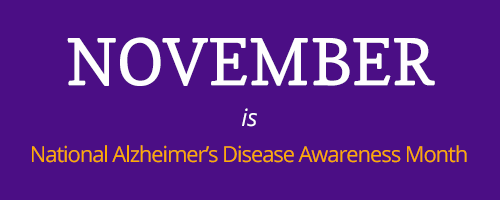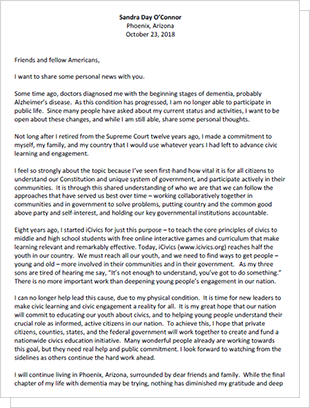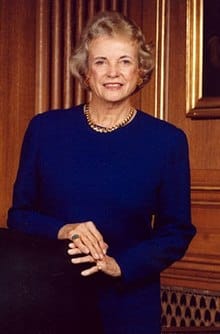The Alzheimer’s Association reports that between 2000 and 2015, deaths from heart disease decreased by 11%, while deaths from Alzheimer’s disease increased by 123%. Startling statistics show that Alzheimer’s kills more seniors than breast cancer and prostate cancer combined.
Currently, 5.7 million Americans are living with Alzheimer’s. Recently, Justice Sandra Day O’Connor announced that she might be one of them.

November is National Alzheimer’s Disease Awareness Month, and my law firm, Chaffin Luhana LLP is working for the civic good by publishing interviews our staff has conducted of family members impacted by Alzheimer’s, interviews of caregivers and support counselors, doctors and key players in the fight against Alzheimer’s.
We were inspired to publish the articles by the InjuryBoard’s Day of Action, which focuses on Alzheimer’s Awareness. We hope that the articles we are publishing throughout November will help support families impacted by this terrible disease, but also inspire and educate others to engage in civic responsibility for the greater good, as Justice Sandra Day O’Connor just recently emphasized.
Justice Sandra Day O’Connor Announces Alzheimer’s Related Diagnosis and Expresses Hope that New Leaders Will Educate Students in Civic Responsibility

At Chaffin Luhana, we have worked on women’s causes for years and have always respected Sandra Day O’Connor, who was the first female member of the United States Supreme Court. In a public letter dated October 23, 2018, Justice O’Connor stated, “Some time ago, doctors diagnosed me with the beginning stages of dementia, probably Alzheimer’s disease.” She explained that as the disease progresses, she will not be able to continue participating in public life.
Wanting to be open about her condition and share some “personal thoughts,” she wrote the letter to encourage all citizens to “participate actively in their communities,” and to work to educate the youth in the country about civic responsibility. Referring to the program she started eight years ago, “iCivics,” which teaches middle school and high school students about the core principles of civics, she asked others to take up the cause of civics education.
“I can no longer help lead this cause,” she wrote, “due to my physical condition. It is time for new leaders to make civic learning and civic engagement a reality for all.” She noted that she continues to live in Phoenix, Arizona, and expressed hope that she has inspired young people to be more active in civic engagement.
“While the final chapter of my life with dementia may be trying, nothing has diminished my gratitude and deep appreciation for the countless blessings in my life.”
Justice O’Connor’s Husband Previously Deteriorated with Alzheimer’s And She Supported Him

This isn’t the first time O’Connor has lived with Alzheimer’s disease. She retired from the Supreme Court in 2006 in part to care for her husband, who had also been diagnosed with Alzheimer’s. Mr. O’Connor was a prominent lawyer himself, and according to the Telegraph, suffered from the disease for 17 years. By 2003, it was affecting both his and his family’s life more seriously, as he was becoming agitated and demanding when his wife was gone to work.
Justice O’Connor began to take him to her court offices with her, and her clerks helped look after him. He would eat lunch with her in her office, and sit in on some legal discussions between the Justice and her law clerks. But by 2005, however, he started to wander around the building, and that’s when Justice O’Connor chose to retire to help look after him. She announced her intention to retire in July 2005, but had to stay until a successor was named in October 2005. Justice Samuel Alito took her place on January 31, 2006.
Justice O’Connor showed an incredible ability as a woman and spouse, to both serve the public good through her work on the U.S. Supreme Court but also be a loving and supportive spouse to her husband who was suffering from Alzheimer’s. There are so many stories of women and men, like hers every day who have either cared for a loved one with Alzheimer’s or has fallen victim to the disease. Through awareness, there is hope for a cure, and support of people and family’s like Justice O’Connor.
Chaffin Luhana Raises Awareness for Alzheimer’s Disease
In an effort to help fight this deadly disease, Chaffin Luhana team members took to walking and publishing materials to support family’s impacted by Alzheimer’s.

The team first participated in Alzheimer’s walks in Pittsburgh and New York City (albeit the NYC event was impacted by weather) and raised over $3,000!
To further raise awareness for Alzheimer’s disease, team members from the firm have interviewed more than a dozen members of the Alzheimer’s community, including researchers, caregivers, support counselors, and more. The series of articles will be published in various formats across our New York, Pittsburgh, and West Virginia Legal Examiner sites during November, which is National Alzheimer’s Awareness Month. By doing so, we hope to help families impacted by Alzheimer’s and inspire others to engage civically in their communities.
If you’d like to stay up to date on our Alzheimer’s disease interviews, be sure to follow us on Facebook. We’ll be sharing the interviews as they’re published and we encourage you to share them with your friends and family.








